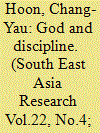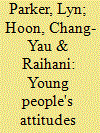|
|
|
Sort Order |
|
|
|
Items / Page
|
|
|
|
|
|
|
| Srl | Item |
| 1 |
ID:
136577


|
|
|
|
|
| Summary/Abstract |
Indonesia's educational landscape has changed in the last two decades. The pressures of globalization have led to the rising popularity of international education offered by international schools, which purport to nurture 'global citizens' who are internationally minded and skilful at engaging with the Other. This article explores the role of an international school in Indonesia in educating young people towards a peaceful existence amid diversity. It focuses on the experiences of children from local elite and upper class families. The author argues that the processes of becoming 'international' are embedded in national and transnational class structures. Becoming 'international' overlaps with becoming Westernized and represents a way for the elite to reinforce their status in Indonesia. At the same time, students learn to engage with others even as their experience of difference at the international school amplifies their sense of being 'Indonesian'.
|
|
|
|
|
|
|
|
|
|
|
|
|
|
|
|
| 2 |
ID:
136575


|
|
|
|
|
| Summary/Abstract |
The author describes the importance of school–family relations in establishing a culture of religious tolerance among pupils of a state senior secondary school in the multicultural city of Palangkaraya, Central Kalimantan. Palangkaraya is a provincial capital city, and is home to different ethnicities and religions. In 2001, a massive ethnic riot erupted between the local Dayak and emigrant Madurese in Sampit, a district in Central Kalimantan province, and quickly spread to other districts, including Palangkaraya. This conflict was regarded as a national tragedy and took hundreds of lives. In this post-conflict context, the author examines how several related aspects of school – culture, curriculum and instruction, politics and policies, and school–community relations – contribute to the school's efforts to nurture religious tolerance among students. The data were derived from the author's ethnographic fieldwork in 2010 employing participant observation, focus group discussions and in-depth interviews with the principal, teachers and students. The findings suggest that students have acquired an embodied cultural capital of religious diversity and tolerance from families and community, and that this has equipped them to help create a 'tolerance culture' in the school, despite the unsupportive school politics and inconsistent school policies related to religious diversity. On their own initiative and, to a lesser extent, inspired by the formal curriculum, religion teachers play a pivotal role in shaping students' understanding of religious diversity and tolerance through deliberate teaching about some aspects of other religions.
|
|
|
|
|
|
|
|
|
|
|
|
|
|
|
|
| 3 |
ID:
136576


|
|
|
|
|
| Summary/Abstract |
The Moluccas were among the provinces devastated by communal conflict following the fall of the New Order regime in 1998. Peace-building activities were conducted after the violence subsided. The field research for this ethnographic study was conducted in the province from January to December 2009. The objective of the study was to examine the nature and impact of peace education projects supported by foreign agencies in selected schools in the province. The findings show that suspicion and hatred between Muslim and Christian students remained intact in Schools 1, 2 and 3, despite the fact that they received a peace education intervention. In these schools, the peace education projects were framed within what was perceived as Moluccan local tradition. However, School 4 was able to mitigate the effects of the conflict and to nurture peace in the school, despite the fact that it did not receive a specifically tailored peace education intervention. Students of School 4 showed a strong preference for national identity, which encompasses religious and ethnic boundaries. The study indicates that identity politics were at play in the form of the inclusion of what was perceived as Moluccan local tradition but the exclusion of other possibilities in the peace education curriculum, as the cases of Schools 1, 2 and 3 show. The study also shows that school principal leadership was prominent in helping to create a peaceful atmosphere, as the case of School 4 reveals.
|
|
|
|
|
|
|
|
|
|
|
|
|
|
|
|
| 4 |
ID:
136574


|
|
|
|
|
| Summary/Abstract |
Religiosity education is an alternative to Catholic religious education in some Catholic schools in Yogyakarta. In religiosity education students learn to appreciate different religions. It was started in 1982 by the late Father Y.B. Mangunwijaya, and later developed by the Commission of Religious Education in the Diocese of Semarang (which includes Yogyakarta). This development took place at a time of tension for Christian schools, because, under the terms of a new law, they had to offer religious education specific to every student's religion. Religiosity education was successfully developed as a new curriculum, which met the criteria of multicultural education. Unfortunately, when the government Education Office in Yogyakarta did not accept religiosity education as an alternative to Catholic religious education, most Catholic schools withdrew from implementing it. The future of religiosity education in Yogyakarta was uncertain. However, this research shows that much Catholic religious education is currently undertaken in the same way as religiosity education, using the reflective pedagogy paradigm. So the spirit of religiosity education remains in these schools – though without the actual term. The paper argues that the spirit of religiosity education should be maintained in Catholic schools in Yogyakarta in order to contribute to making Yogya a true 'city of tolerance'.
|
|
|
|
|
|
|
|
|
|
|
|
|
|
|
|
| 5 |
ID:
136573


|
|
|
|
|
| Summary/Abstract |
A school is an institution in which student subjectivity is constituted and reinscribed through various 'disciplinary technologies'. The interplay between discipline and discipleship in the practice of Christian education is mutually constitutive. Through the study of a Protestant Christian school in Jakarta, this article explains the disciplinary technologies deployed by the school in its inculcation of discipline and character building. By examining the school's religious education practices the study provides insight into the perceptions of the school management, teachers and students with regard to various ethical, moral and religious issues. The author considers how Christian schools can develop critical reflective skills and respect for differences, and so can contribute to a tolerant, peaceful and multicultural Indonesia.
|
|
|
|
|
|
|
|
|
|
|
|
|
|
|
|
| 6 |
ID:
136572


|
|
|
|
|
| Summary/Abstract |
This paper argues that recent inter-religious conflict in Indonesia highlights a need for the education system to address problems of religious intolerance through religious education and the religious culture in schools. The position of religion vis-à-vis the state and education indicates that such action is appropriate in the Indonesian context. The paper analyses approaches to inter-faith education and education for religious tolerance globally, and addresses some of the issues that arise. It then turns to Indonesia, outlining the curricula for religion as a school subject and recent changes in the education system. The ethnographic section of the paper examines how three exceptional private faith schools – one Islamic and two Catholic – in Yogyakarta and West Sumatra offer new ways of teaching inter-religious tolerance. The paper demonstrates how religious education in schools can foster inter-religious tolerance and understanding.
|
|
|
|
|
|
|
|
|
|
|
|
|
|
|
|
| 7 |
ID:
136571


|
|
|
|
|
| Summary/Abstract |
This paper presents the attitudes of high school students in Indonesia towards inter-ethnic and inter-religious socializing, courtship and marriage. It also explores how different personal characteristics and social conditions such as gender, ethnicity, type of school and community affect these attitudes. The basic findings come from a survey of more than 3,000 students in senior high schools in five provinces of Indonesia: Jakarta, Yogyakarta, West Sumatra, Central Kalimantan and Bali. Survey data were supplemented with data from interviews and focus group discussions with students and from participant observation in and around the same schools. The authors found that most students were positive about friendships with people of different ethnicities and different faiths. However, most students did not agree with inter-religious marriage, because they perceived that their religion forbad it. This research was part of a large team project examining how education can contribute to building a more tolerant and multicultural Indonesia.
|
|
|
|
|
|
|
|
|
|
|
|
|
|
|
|
|
|
|
|
|